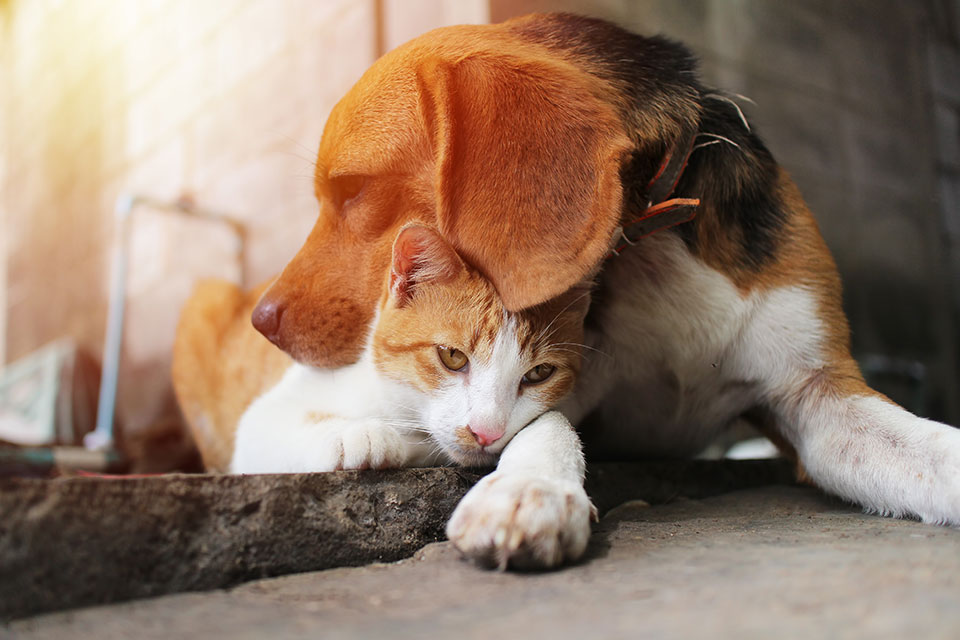Cat Loving Dog Breeds
 May 2, 2019
May 2, 2019
Are you a cat lover looking for the perfect dog to share your home? Pets Training & Boarding take a look at some wonderful dog breeds that simply adore felines of all shapes and sizes.
When it comes to dog breeds, some will tolerate cats more than others. Keeping in mind that certain dog breeds have been trained and specifically bred for many years for a certain task. Because of this, some breeds can learn to live in harmony with cats easily, while others may never truly accept your feline friend other than something to chase or annoy.
All dogs, if socialised and trained correctly, can learn to tolerate your beloved cat. But for some breeds, the inherited desire to give chase or herd can simply be too much to bear! Meaning at some stage they may take chase to your kitten or older cat, causing a ruckus of hissing and growls.
Breeds in the toy or sporting groups tend to be more suited to life with cats, while other breeds such as terriers, hounds or herding breeds may take a little longer to accept kitty, or vice versa.
Remembering that terriers were developed to initially hunt and kill vermin, hounds simply love to chase and herding breeds, well…love to herd– including the family cat! That is not to say these breeds cannot learn to live with your friendly feline, it just might take a bit more work and end up in a relationship of tolerance more than harmony.
Introducing Your Puppy to a Cat
They key is socialisation from a young age and teaching your puppy that it is not OK to chase the cat.
Your older cat may hiss and growl at your puppy. This is OK as long as it does not turn aggressive. Teach you pup to sit and watch the cat from a safe distance. Using a lead can help prevent any boisterous actions towards your older cat.
Always have high posts and hiding places available for your older cat to escape your pup’s attention. Do not punish your older cat for hissing or growling at the new family member. Things normally settle down in time as your cat used to having the puppy around.
Do not force your cat to be in the presence of your puppy. These relationships take time!
Other ideas include:
- Distraction – use a game to distract your pup’s attention away from your cat.
- Watching – allow your puppy to watch your cat play etc. ensure they are on lead or in their crate to prevent any chasing behaviour.
- Training – train your pup to be ‘gentle’ around your cat and do not allow them to chase or pounce on your cat.
- Safe Zone – have a puppy-free safe area that your cat can retreat too.
Introducing Your Kitten to a Dog
With a tiny kitten meeting a dog – it is best to allow your dog to have a good sniff of the area where the kitten has recently been. Meeting through a glass door is also a good idea so your kitten can see your dog without being able to get close.
Your kitten might hiss or growl or puff up, however this is normal behaviour.
Do not allow your dog to overly sniff or paw at your little kitten.
When your kitten first comes home and is allowed to explore the home, pop your older dog on a leash on their bed with some tasty treats. Distract your dog as the kitten comes close with praise and pats. Eventually your dog will accept the new family member.
Other ideas include:
- Safe Area – your kitten should have a safe area where your dog can not roam. This could be a warm bedroom. You will find your kitten will retreat to this area when spooked or scared.
- Training – it is very important your dog is well trained. Teaching them commands such as ‘leave it’ can help you control their interactions.
- Supervision – always supervise your young kitten and dog’s interactions. Never leave them alone together when your kitten is young.
- Perches – have high perches and other hiding areas your kitten can hide if your dog does give chase.
Top Cat Love Dog Breeds
